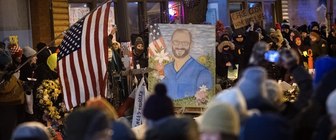Americans remain skeptical of pro-Palestinian protests taking place across the country. They are divided on whether such protests are mostly violent or nonviolent, and whether they involve students or non-students. Most people are in favor of a ceasefire between Israel and Hamas, but just one in four think universities should divest from companies with Israeli ties.
The latest Economist/YouGov poll finds that about twice as many Americans strongly or somewhat oppose the pro-Palestinian campus protests as support them (50% vs. 26%). Democrats are divided, with 43% supporting the protesters and 32% opposed. Three-quarters of Republicans are opposed, while only 8% are supportive. Young adults are more likely than older Americans to favor the protests.
Just 23% of Americans support one of the stated goals of the protests — that colleges sell their investments in companies with ties to Israel. On this question, Democrats and Republicans don't differ by a wide margin: 27% of Democrats and 21% of Republicans support divestment. In general, however, many Americans (41%) are in favor of giving students a say in where their colleges' financial endowments are invested.
Americans have differing perceptions of who is involved in the protests and what tactics are being used. Slightly more believe most protesters are nonviolent (38%) than believe most are violent (30%). And nearly equal shares believe the campus protests are composed of mostly students, faculty, and alumni (35%) as believe they are made up of people not affiliated with the colleges (32%). Republicans are far more likely than Democrats and Independents to believe a majority of protesters are violent and are not affiliated with the colleges where they're protesting.
Another recent YouGov survey asked about the wearing of masks at protests — a point of controversy during recent demonstrations. While 68% of Americans believe that peaceful public protesters at least sometimes face negative repercussions in their personal or professional lives, half as many (32%) say it is acceptable for them to wear masks that conceal their identities. 46% say it is unacceptable. Opinions are similar about police officers wearing masks when responding to protests: 33% say it is acceptable and 45% say it is unacceptable.
Americans overall are more likely to say college administrators' response to the protests hasn't been harsh enough (33%) than to say it has been too harsh (16%), though half either say it has been about right (18%) or are unsure (33%). Fewer believe responses from police haven't been harsh enough (25%), and 21% say they have been too harsh. Few Democrats believe administrators or police haven't been harsh enough, while about half of Republicans think this about each group.
Given a list of possible consequences for protesters who have set up encampments, majorities of Republicans — but fewer than 30% of Democrats and Independents — would forcibly remove the protesters, fine them, expel them, and arrest them.
Two-thirds of Americans (64%) strongly or somewhat support a ceasefire between Israel and Hamas, while just 13% oppose one. Yet opinion on a ceasefire is very different if it would mean Hamas does not release remaining Israeli hostages: Only 28% say they are in favor of one, while 44% are opposed.
— Carl Bialik and Bryn Healy contributed to this article
See the toplines and crosstabs from the Economist/YouGov poll conducted on May 5 - 7, 2024 among 1,813 U.S. adult citizens.
Methodology: Respondents were selected from YouGov’s opt-in panel using sample matching. A random sample (stratified by gender, age, race, education, geographic region, and voter registration) was selected from the 2019 American Community Survey. The sample was weighted according to gender, age, race, education, 2020 election turnout and presidential vote, baseline party identification, and current voter registration status. Demographic weighting targets come from the 2019 American Community Survey. Baseline party identification is the respondent’s most recent answer given prior to November 1, 2022, and is weighted to the estimated distribution at that time (33% Democratic, 31% Republican). The margin of error for the overall sample is approximately 3%.
Image: Getty











